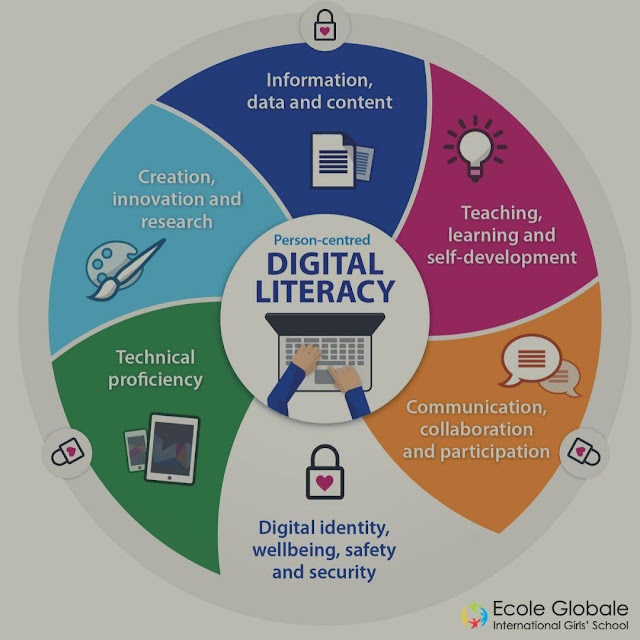 |
| Digital Literacy |
Every educator
is aware of the thought of literacy—the ability to read and write. An
illiterate individual, who cannot read or write, can inevitably struggle to
urge on in society. It's not possible to go on to higher education or get a
high-paying job without the ability to read and write. Even day to day tasks,
like reading a newspaper or filling out job applications, is tough for an
illiterate person.
In today's world, literacy goes on the
far side, simply the fundamental ability to comprehend text. Today's students
will master a new skill—digital literacy. Ecole Globale, the best boarding school for girls, defines digital
literacy as "the ability to seek out, evaluate, utilize, share, and create
content using data technologies and the net." Today's world has accustomed
to digital media. Even boarding schools
in India bring the latest development in the traditional education system
by starting the digital literacy program.
Digital literacy, by this definition,
encompasses a good vary of skills, all of that is necessary to reach an
increasingly digital world. As print mediums begin to die out, the ability to
understand the information found on-line becomes additional and more necessary.
Students who lack digital literacy skills could, before long, find themselves
at even as a lot of a disadvantage as people who cannot read or write.
Because digital literacy is thus
necessary, educators are progressively needed to teach students digital
literacy within the room. In many ways, this is often almost like what
educators have forever done in teaching students to read and write. In
alternative ways in which, however, digital literacy could be an innovative
skill.
Most students already use digital
technology from childhood, such as tablets, smartphones, and computers, at
home. Several students already know how to navigate the web, share pictures on
social media, and do a Google search to seek out info. However, true digital
literacy goes on the far side of these basic skills.
One of the most necessary parts of
digital literacy is that the ability not simply to find, however conjointly to
evaluate, data. This suggests finding the solution to a question or a bit of
needed information then deciding whether the source is reliable. Educators
will, and should, teach students the way to tell whether information on the web
is true. The flexibility to weed out false data and realize reliable sources
could be a key part of digital accomplishment and important life skills in the
twenty-first century.
Educators will begin by teaching
students the way to realize author information, dates of publication, and
alternative data that may reveal whether an on-line source is reliable.
Students ought to conjointly learn to tell the distinction between different
kinds of websites. As an example, a .com web site may be less reliable than a
.edu site. Understanding these variations is one example of digital literacy.
Learning the way to find data is just
one a part of digital literacy. Knowing the way to share information is
another. Students these days are perpetually warned regarding the risks of
posting inappropriate pictures or text on-line, however, it's still necessary
for lecturers to discuss. The flexibility to make and share online is
considered a part of digital literacy and maybe educated in schools.
Students ought to know how digital
writing differs from traditional writing—for example, the way to include
pictures and links in writing. They must even have an understanding of what
kind of audience they're sharing with on-line. Just like a personal essay
differs from a research paper, a post on Facebook is different from an article
for a web site or weblog.
As technology becomes a part of the
lifestyle, it's additional necessary than ever for educators to show digital
accomplishment. Whether they plan on attending college or not, students can
need digital literacy to achieve success in their personal and skilled lives.
How will educators facilitate their
students to navigate the digital world? Allow us to understand what you think
that regarding digital literacy and education!
No comments:
Post a Comment